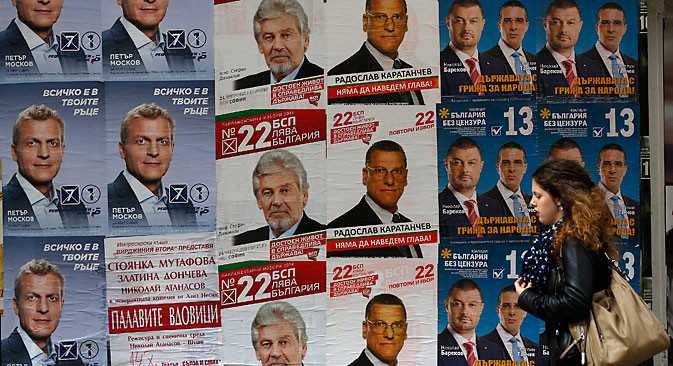
Parliamentary elections were held in Bulgaria on Oct.5 to elect the 43rd National Assembly. Source: Reuters
Writing about the parliamentary elections in Bulgaria, Novaya Gazeta reports that the voting was heavily influenced by Bulgarian President Rosen Plevneliev’s “revelatory speech about Putin.”
The early National Assembly elections were an attempt to overcome the political crisis that struck Bulgaria in the winter of 2013. Along with domestic problems, other leading campaign issues were Bulgaria’s further integration into Europe and its relations with Russia, Novaya Gazeta writes.
Russian-Bulgarian relations were such a hot topic during campaigning that on the eve of the vote President Plevneliev spoke out to German newspaper Frankfurter Allgemeine Zeitung to express his opinion and the position of Bulgarian reformers toward both Brussels and Moscow. The president’s negative attitude towards Kremlin politics was one of the key arguments during the political struggle in the parliamentary elections, Novaya Gazeta reports.
Nezavisimaya Gazeta reports on Assistant Secretary of State for European and Eurasian Affairs Victoria Nuland’s visit to Kiev, during which she reconfirmed Washington’s line on the Russia-Ukraine conflict.
In a recent statement, Nuland said that the United States will not provide Ukraine with weapons and thereby facilitate a military solution to the conflict in the Donbass, the newspaper writes.
According to Kiev, the West’s approach to the events in Ukraine hinges on Washington. “If it weren’t for the U.S., Europe would have allowed Ukraine to fall under Russia’s wing long ago,” a Ukrainian official told Nezavisimaya Gazeta.
Meanwhile, the Ukrainian government and parliament (Verkhovna Rada) have held emergency meetings to approve a package of anti-terrorist bills. “The West is willing to provide aid but is demanding urgent reforms,” Nezavisimaya Gazeta reports.
In Kiev, more and more demands are being made on the authorities not to hide behind the war to justify its lack of action. Ukraine’s Western partners are doing the same and with ever more urgency, writes the newspaper, which notes that the West has taken the stance of helping the Ukrainian authorities and, if necessary, forcing them to implement the reforms demanded during the Maidan demonstrations in the winter of 2013-2014.
The first round of the Brazilian presidential elections have not yielded a clear winner, the Kommersant daily reports. As sociologists had predicted, Dilma Rousseff is in the lead. However, Rousseff’s opponent for the second round came as a surprise; one-time frontrunner Marina Silva’s campaign as the people’s candidate did not seem to help her; she was overtaken by Aecio Neves for second place.
Director of the Moscow-based Ibero-American Institute Vicente Barrientos says in a forecast for Kommersant that the majority of Brazilians will vote for Rousseff in the second round. In her election program, the president recalled her administration’s achievements: record low unemployment, higher wages, and social programs.
Meanwhile, “her opponent is emphasizing insufficiencies in the state line: The Brazilian economy is in recession, inflation is growing, and the Brazilian Real has weakened to a 16-year low,” Kommersant writes.
The key difference between the two candidates’ platforms lies in their foreign policies. While Rousseff is a fervent supporter of integration in the framework of BRICS and Mercosur, Neves promises to nurture pragmatic relations with leftist Latin American regimes, to pay more attention to Asia, and to cooperate with the U.S.
All rights reserved by Rossiyskaya Gazeta.
Subscribe
to our newsletter!
Get the week's best stories straight to your inbox